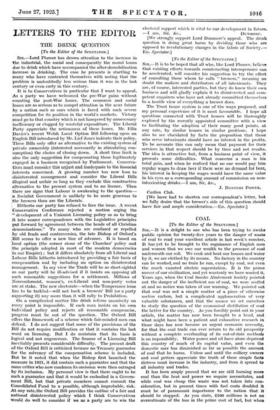LETTERS TO THE EDITOR
THE DRINK QUESTION [To the Editor of the SPECTATOR.]
Sm,—Lord Plumer has drawn attention to the increase in the industrial, the social and consequently the moral losses due to drink which have accompanied the after-demobilization increase in drinking. The case he presents is startling to many who have contented themselves with noting that the :problem is undoubtedly less serious than it was in the last century or even early in this century.
It is to Conservatives in particular that I want to appeal. As a party we have welcomed the pre-War gains without counting the post-War losses. The economic and social losses are so serious as to compel attention in the near future by a nation such as ours which is faced with such severe competition for its position in the world's markets. Victory must go to that country which is not hampered by unnecessary inefficiency or clogged by wasteful expenditure. The Liberal Party appreciate the seriousness of these losses. Mr. Ellis Davies's recent Welsh Local Option Bill following upon an English Bill introduced by Mr. Lief Jones indicate their policy. These Bills only offer as alternative to the existing system of 'private ownership (interested necessarily in stimulating con- sumption) the choice of closing down. A short time limit is also the only suggestion for compensating those legitimately engaged in a business recognized by Parliament. Conserva- tives must consider this unjust and inadequate to the financial ;interests concerned. A growing number too now lean to :disinterested management and consider the Liberal Bills 'illogical and unfair so long as they exclude this constructive alternative to the present system and to no licence. Then there are signs that Labour is awakening to the question— )a Socialist Government is unlikely to be more generous to the brewers than are the Liberals.
Hitherto our party has refused to face the issue. A recent Conservative Conference rejected a motion urging the 1" development of a Unionist Licensing policy so as to bring it into nearer correspondence with the Legislative principles put forward by agreement between the heads of all Christian denominations." To many who are confused or repelled by old feuds and controversies, the late Bishop of Oxford's Bill seems to offer a new line of advance. It is based on 'local option (the corner stone of the Churches' policy and the principle adopted in most of the modern democracies in our Empire) ; but it differs absolutely from all Liberal and ;Labour Bills hitherto introduced by providing a fair basis of compensation and by including an option on disinterested management. In my view the Trade will be as short-sighted as our party will be ill-advised if it insists on opposing all such reasonable suggestions for a settlement Millions of Nonconformist, women's, ex-Liberal and non-party votes are at stake. The new electorate—when the Temperance issue has to be tackled—will not back a brewers' Bill (or a party supporting it) any more than it will rally to Prohibition.
On a complicated matter like drink reform unanimity on every point is impossible. If each man insists on his own individual policy and rejects all reasonable compromise, progress must be out of the question. The Oxford Bill ,offers the framework of a scheme which fair-minded men can defend. I do not suggest that some of the provisions of the Bill do not require modification or that it contains the last word on licensing. But I do maintain that its basis is logical and not ungenerous. The finance of a Licensing Bill inevitably presents considerable difficulty. The present draft of the Oxford Bill is criticized because no Treasury guarantee for the solvency of the compensation scheme is included. But be it noted that when the Bishop first launched the measure in 1921, it did contain such a guarantee and that the same critics who now condemn its omission were then outraged by its inclusion. My personal view is that there ought to be
such a guarantee and that it would be embodied in a Govern- ment Bill, but that private members cannot commit the
Consolidated Fund to a possible, although improbable, risk. At any rate,the Oxford Bill provides the outline of a fair and national disinterested policy which I think Conservatives 'would do well to consider if we as a party are to win the
electoral support which is vital to our development in future.
[We strongly support Lord Dunmore's appeal. The drink question is doing great harm by dividing those who are opposed to revolutionary changes in the fabric of Society.— En. Spectator.]










































 Previous page
Previous page